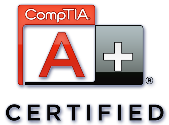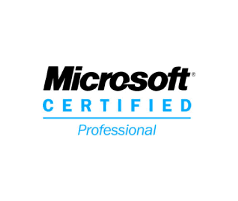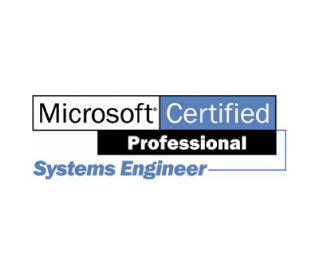We certainly don’t expect you to understand all those letters are after our technicians’ names or what they stand for. This page explains which certifications our techs carry and why we feel they are so important to have!
 A+ Certification is a testing program sponsored by CompTIA that certifies the competency of service and repair technicians in the computer industry. Anyone who wants an internationally recognized credential as a competent computer service professional can take the A+ examination. The program is backed by major computer hardware and software vendors, distributors, resellers and publications. Earning A+ certification means that the individual possesses the knowledge, skills, and customer relations skills essential for a successful computer service and repair technician, as defined by experts from companies across the industry. The test covers a broad range of computer hardware and software technologies, but are not related to any vendor-specific products. When both the Core and the DOS/Windows portions are passed, the candidate receives the A+ designation.
A+ Certification is a testing program sponsored by CompTIA that certifies the competency of service and repair technicians in the computer industry. Anyone who wants an internationally recognized credential as a competent computer service professional can take the A+ examination. The program is backed by major computer hardware and software vendors, distributors, resellers and publications. Earning A+ certification means that the individual possesses the knowledge, skills, and customer relations skills essential for a successful computer service and repair technician, as defined by experts from companies across the industry. The test covers a broad range of computer hardware and software technologies, but are not related to any vendor-specific products. When both the Core and the DOS/Windows portions are passed, the candidate receives the A+ designation.
 Microsoft Certified Professional (MCP) certification validates IT professional and developer technical expertise through rigorous, industry-proven, and industry-recognized exams. MCP exams cover a wide range of Microsoft products, technologies, and solutions.
Microsoft Certified Professional (MCP) certification validates IT professional and developer technical expertise through rigorous, industry-proven, and industry-recognized exams. MCP exams cover a wide range of Microsoft products, technologies, and solutions.
When you pass your first qualifying MCP exam, you automatically become a Microsoft Certified Professional and gain access to MCP benefits. You also join a community of millions of MCPs, with thousands more joining every month. After you become an MCP, you’re on your way to distinguishing yourself through expert certifications including Microsoft Certified Solutions Expert (MCSE), and Microsoft Certified Solutions Developer (MCSD).
 Microsoft Certified Systems Engineers are often systems engineers, network engineers, systems analysts, network analysts, or technical consultants. They plan, design, and implement Microsoft Windows server solutions and architectures in medium- to large-sized companies. Our technicians have experience implementing and administering network operating systems and desktop operating systems. In a technology lifecycle, they excel at planning, design, and implementation.
Microsoft Certified Systems Engineers are often systems engineers, network engineers, systems analysts, network analysts, or technical consultants. They plan, design, and implement Microsoft Windows server solutions and architectures in medium- to large-sized companies. Our technicians have experience implementing and administering network operating systems and desktop operating systems. In a technology lifecycle, they excel at planning, design, and implementation.
 A+ Certification is a testing program sponsored by CompTIA that certifies the competency of service and repair technicians in the computer industry. Anyone who wants an internationally recognized credential as a competent computer service professional can take the A+ examination. The program is backed by major computer hardware and software vendors, distributors, resellers and publications. Earning A+ certification means that the individual possesses the knowledge, skills, and customer relations skills essential for a successful computer service and repair technician, as defined by experts from companies across the industry. The test covers a broad range of computer hardware and software technologies, but are not related to any vendor-specific products. When both the Core and the DOS/Windows portions are passed, the candidate receives the A+ designation.
A+ Certification is a testing program sponsored by CompTIA that certifies the competency of service and repair technicians in the computer industry. Anyone who wants an internationally recognized credential as a competent computer service professional can take the A+ examination. The program is backed by major computer hardware and software vendors, distributors, resellers and publications. Earning A+ certification means that the individual possesses the knowledge, skills, and customer relations skills essential for a successful computer service and repair technician, as defined by experts from companies across the industry. The test covers a broad range of computer hardware and software technologies, but are not related to any vendor-specific products. When both the Core and the DOS/Windows portions are passed, the candidate receives the A+ designation. Microsoft Certified Professional (MCP) certification validates IT professional and developer technical expertise through rigorous, industry-proven, and industry-recognized exams. MCP exams cover a wide range of Microsoft products, technologies, and solutions.
Microsoft Certified Professional (MCP) certification validates IT professional and developer technical expertise through rigorous, industry-proven, and industry-recognized exams. MCP exams cover a wide range of Microsoft products, technologies, and solutions. Microsoft Certified Systems Engineers are often systems engineers, network engineers, systems analysts, network analysts, or technical consultants. They plan, design, and implement Microsoft Windows server solutions and architectures in medium- to large-sized companies. Our technicians have experience implementing and administering network operating systems and desktop operating systems. In a technology lifecycle, they excel at planning, design, and implementation.
Microsoft Certified Systems Engineers are often systems engineers, network engineers, systems analysts, network analysts, or technical consultants. They plan, design, and implement Microsoft Windows server solutions and architectures in medium- to large-sized companies. Our technicians have experience implementing and administering network operating systems and desktop operating systems. In a technology lifecycle, they excel at planning, design, and implementation.